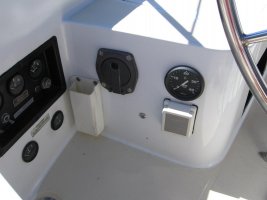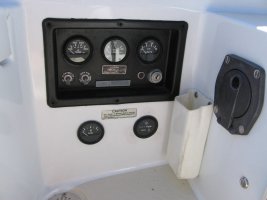Frank Langer
1984 Ericson 30+, Nanaimo, BC
I would like to reconfigure the engine gauges on our E30+ to ensure I have the most useful information while running the engine.
I currently have a fuel gauge which works pretty well in conjunction with the engine hour meter to monitor fuel level, so I think I should keep that.
I have a water temperature gauge which I monitor religiously, and which is connected to an overheat warning buzzer. It suffers from condensation in the lens to the point where it is hard to read on some days, so I think I should replace it.
I also have an ammeter which is no longer working, and that is the spot where recommendations would be especially helpful. Because the engine wiring was modified as recommended on this site, the ammeter used to only show an electrical draw when the glow plug was operated; the rest of the time it read at "0", so was of little use. I think it would be nice to know if the glow plugs are both still working--ie. depending on the amount of draw, I could tell if one or both plugs were operational. I also have a link 10 system which shows battery voltage and amp draw located in the salon. Also, my electrical panel in the quarterberth has both an analogue voltmeter and ammeter connected just to the house battery (though maybe to the starter battery as well if I have the battery selector switch on "both"--I'll have to check that).
I have a red warning light that goes on if oil pressure/level drops, but don't have an oil pressure gauge. I think the likelihood of a problem in this area is pretty small, though consequences could be serious.
I plan to remove the broken ammeter gauge on the engine panel, and could simply replace it to get that glow plug draw information, but I'm wondering if there would be a better gauge to put in there to give me more useful information. Any ideas?
I don't have a tachometer which could be useful, but I've heard they are quite unreliable, and I have no idea how to wire it in. Or perhaps a voltmeter, so I can see if the alternator is still charging properly while operating the engine (though I can see that if I go below into the salon to check the Link 10, but I don't do that often while motoring, as I should be on the helm.
I do quite alot of singlehanded sailing, so convenient easy access to information is helpful, and access to the most critical information is what I'm after. Any thoughts and recommendations would be most helpful!
Frank
I currently have a fuel gauge which works pretty well in conjunction with the engine hour meter to monitor fuel level, so I think I should keep that.
I have a water temperature gauge which I monitor religiously, and which is connected to an overheat warning buzzer. It suffers from condensation in the lens to the point where it is hard to read on some days, so I think I should replace it.
I also have an ammeter which is no longer working, and that is the spot where recommendations would be especially helpful. Because the engine wiring was modified as recommended on this site, the ammeter used to only show an electrical draw when the glow plug was operated; the rest of the time it read at "0", so was of little use. I think it would be nice to know if the glow plugs are both still working--ie. depending on the amount of draw, I could tell if one or both plugs were operational. I also have a link 10 system which shows battery voltage and amp draw located in the salon. Also, my electrical panel in the quarterberth has both an analogue voltmeter and ammeter connected just to the house battery (though maybe to the starter battery as well if I have the battery selector switch on "both"--I'll have to check that).
I have a red warning light that goes on if oil pressure/level drops, but don't have an oil pressure gauge. I think the likelihood of a problem in this area is pretty small, though consequences could be serious.
I plan to remove the broken ammeter gauge on the engine panel, and could simply replace it to get that glow plug draw information, but I'm wondering if there would be a better gauge to put in there to give me more useful information. Any ideas?
I don't have a tachometer which could be useful, but I've heard they are quite unreliable, and I have no idea how to wire it in. Or perhaps a voltmeter, so I can see if the alternator is still charging properly while operating the engine (though I can see that if I go below into the salon to check the Link 10, but I don't do that often while motoring, as I should be on the helm.
I do quite alot of singlehanded sailing, so convenient easy access to information is helpful, and access to the most critical information is what I'm after. Any thoughts and recommendations would be most helpful!
Frank
Last edited:



